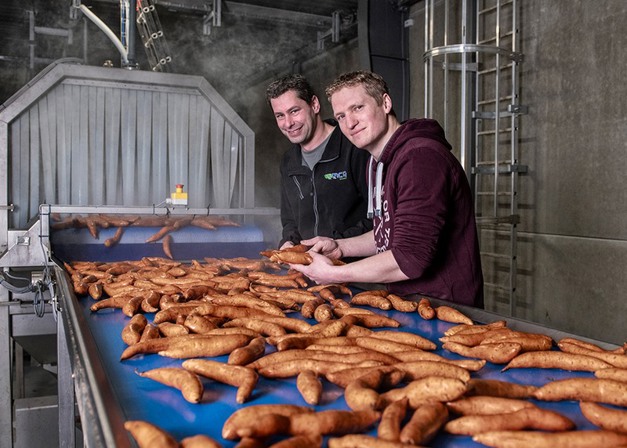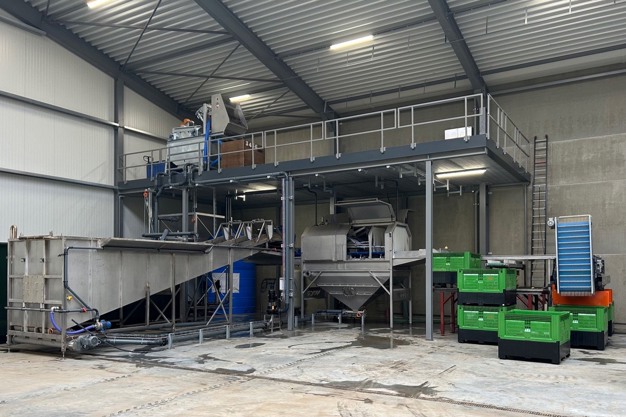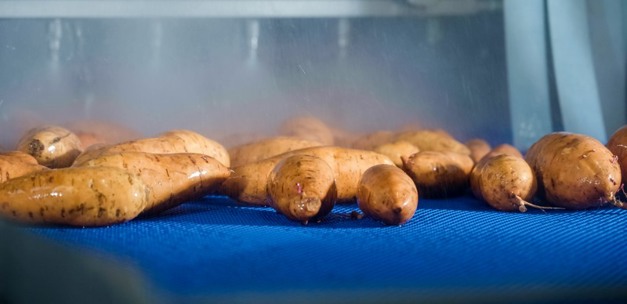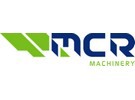Polderjongens has entered into a collaboration with MCR Machinery for its new washing system. "With the new system, we can thoroughly clean the sweet potatoes without damaging them," says Jan Pieter Reijnoudt of MCR Machinery. The machine manufacturer is proud of its collaboration with Polderjongens.

Joris Koenraadt, together with brother Thijs and parents Harry and Annet, runs the Koenraadt farm on Tollebekerweg in Tollebeek. They grow seed potatoes, onions, sugar beets, and wheat. Seven years ago, they added sweet potatoes to their crops. They now cultivate about 30 hectares of this exotic annually. With Polderjongens, run by brother Stefan, they try to fully market their own products. Yet, starting the cultivation of sweet potatoes on polder clay is quite special. "Yes, it's quite unique. We stopped growing carrots seven years ago and were looking for another crop that offered enough cultivation challenges and had market potential. That became the sweet potato. In the Netherlands, 300 sea containers full of sweet potatoes are imported weekly, so why shouldn't we be able to grow them here?" explains Joris.
However, he indicates that it didn't all go smoothly from the start. "No, it's a costly cultivation. You have to compete with a global market, and there's still very little experience with it in the Netherlands. In our country, about 200 hectares are cultivated in total, of which we cultivate about 30 hectares. Another difficulty is that sweet potato cultivation is risky; everything has to go right. And in seven years, that has never completely happened to us. Every year something happens that causes the yield to be somewhat disappointing." A start with ups and downs, but no reason to stop for these young entrepreneurs. "No, there is a lot of demand for sweet potatoes, which makes it interesting. And it fitted into our cultivation plan with the other crops we have. Moreover, sweet potato cultivation is very robust by nature. You need few crop protection products. That makes the crop very suitable for cultivation under the Planet Proof sustainability certificate."
New washing machine
This led Polderjongens to take steps in processing as well. "We decided to do the washing ourselves. With other parties, our sweet potatoes were receiving too much damage; we wanted it done differently. Now we have an in-house washing line that indeed does it much better and is also sustainable." For this, the family eventually turned to MCR Machinery, specialized in washing systems for the food processing industry. Jan Pieter: "We were working on a machine that could wash delicate products and heard about Joris' plans. Sweet potatoes are just more easily damaged than regular potatoes. We had made a test machine for this that we wanted to try out. And Joris was interested in it."
It was a bit of an adjustment, Joris indicates. "When the machine was turned on, it sounded very rough," he laughs. "So we doubted for a moment. But fortunately, it turned out to work very gently, the sweet potatoes came through without a scratch and very clean. We were very happy about that." Jan Pieter continues about how this was developed. "We use a large water tank, where the sweet potatoes are tipped from the cubic box after harvest. In the water, they don't roll against each other, so they don't damage each other. They are then transported to the washing area via a conveyor belt, through a clod separator that first removes the clods. We use a mesh belt, so the potatoes are sprayed clean from below and above. This happens twice, after which they are rinsed once more."

Sustainable processing
Besides sustainable cultivation, it was also important for the Koenraadt family to maintain this sustainability in processing. "This is partly due to the Undine Cleaning Technology," explains Jan Pieter. "Which is widely used in slaughterhouses, among others. Because you add air to the water, you need much less water. It becomes a kind of fine mist, which also gets into the pores of the sweet potato and flushes out the bacteria. This makes the product last much longer. And that's sustainable too. The water is kept at a temperature of 12 to 15 degrees, the process water is filtered and reused. So, by reusing it, you also need less energy to keep the water at the right temperature. And you don't need a large basin for the rinse water."
The project had its challenges, but everything is now running at full speed, the gentlemen indicate. "Yes. We had to adjust the machine a bit, for example, because the washing line had to be able to process about 10 tons of sweet potatoes per hour. And for Joris, we also added a sorter in the line, and now that it's fully implemented, the washing line is running at about 95 percent optimal. But it remains a 'work in progress'; we are still fine-tuning. The nice thing is that we have now sold a second version of this machine to a company in Switzerland. So, there is interest," Jan Pieter continues.

Sustainability is a key theme for the Koenraadt family and Polderjongens, as evidenced by the other efforts they make to ensure it. "For example, we supply our sweet potatoes to supermarkets, but always end up with about 100 to 150 tons of residual product," Joris continues. "These are potatoes that are not pretty enough for the store. We wanted to do something about this. With Polderjongens, we try to find a market for it. Our residual product can be perfectly processed in soups and sauces. And we store our potatoes in such a way that the skin becomes thicker, and they are more durable. The energy required for this comes from our own wind turbine and our 1200 solar panels. And the ridges where the potatoes grow are covered with 100 percent biodegradable black foil, which prevents weeds and warms the soil. Because sweet potatoes can't stand the cold."
Pioneering
All in all, both parties are satisfied with the collaboration and look forward to potential next steps in the future. "For us, technology never stands still. We always have to keep up with the latest developments, because our customers also ask for it. That's what makes it so fun." Joris adds: "I think the Noordoostpolder is still the place to pioneer. We have good agricultural knowledge here, good soil, a good agricultural logistics, and a healthy dose of courage. We're not too afraid to try something new, neither is MCR. And then you can come up with some really nice new things."
For more information:
Jan Pieter Reijnoudt
MCR Machinery B.V.
+31 (0)527 - 205900
[email protected]
www.mcrmachinery.nl
Joris Koenraadt
Polderjongens
[email protected]
www.polderjongens.nl
